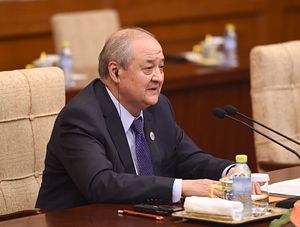An Uzbek official has just returned from a second meeting with the Taliban in the past six months. The frequent meetings indicate that Tashkent is pursuing something significant with regard to the war in Afghanistan. Announcements about these meetings usually come after the fact, with few details. This caution could be due to hesitancy on the part of Tashkent, which may still be scoping out the situation and working to define its role as the conflicting sides enter a new stage of negotiations. In addition, Tashkent has never come close to establishing compromise with its own religious fundamental forces in the 1990s and 2000s, a contradiction to its pursuit of talks with the Taliban.
Uzbek Foreign Minister Abdulaziz Kamilov met with Taliban leadership in the capital of Qatar, Doha, on March 4. During the meeting, the head of the Taliban’s diplomatic office in Doha Mullah Baradar Akhund endorsed President Shavkat Mirziyoyev’s political and economic endeavors in Afghanistan. No other substantive message relating to the meeting was released. Nevertheless, the meeting with Baradar was significant enough that upon return to Tashkent, on March 6, Kamilov met with an Afghan delegation led by Hamdullah Mohib, Afghan President Ashraf Ghani’s national security advisor. Official reports on that meeting are similarly vague, but Kamilov likely briefed the Afghan delegation on his trip to Doha.
In June 2018, the Ministry of Foreign Affairs of Uzbekistan announced for the first time that it established contacts with the Taliban. Such contacts could have been established earlier as Taliban members were reportedly invited to, but declined to participate, in a conference on Afghanistan held in Tashkent in March 2018. The Taliban likely were not ready for the spotlight at an international conference, but eventually came to Tashkent in August 2018. It was the first time the Taliban had done so since their participation at the “6+2” meeting held in Tashkent in 1999.
The maneuverings with regard to the Taliban from the Uzbek side are spearheaded by Foreign Minister Kamilov. Kamilov paid his first official visit to Kabul under the new administration on January 23, 2017, only a month after Mirziyoyev was inaugurated. Soon after that, interactions between Afghan and Uzbek diplomats became a regular occurrence. The other Uzbek official dealing with Afghanistan is Special Representative Ismatulla Irgashev, who was appointed in May 2017.
Uzbekistan is currently capitalizing on the fact that neither the Afghan government nor the Taliban is ready to communicate and negotiate with each other. Tashkent has willingly assumed an intermediary role. Meetings with the Taliban usually alternate with meetings with Afghan government officials, likely to deliver messages from one to the other. Although so far merely a messenger, Uzbekistan has a strong position on how peace in Afghanistan can be reached. According to Tashkent, the peace process should be managed by Afghans themselves, without the interference of other countries and through a direct dialogue without preconditions from the parties.
Uzbekistan’s interest in Afghanistan finally settling in peace is twofold. First, Uzbekistan does not want an oozing wound to its south that could jeopardize its own security: “Secure Afghanistan means secure Uzbekistan, prosperous and stable South and Central Asia,” summarized Mirziyoyev at the March 2018 conference in Tashkent. Second, Uzbekistan is interested in playing a greater economic role in Afghanistan. Two projects of particular importance are the Surkhan-Puli Khumri energy project aimed at increasing the delivery of electricity from Uzbekistan to Afghanistan, and a transportation project to extend the existing Hairatan-Mazar-i-Sharif railroad to Herat. The latter project has a long-term implication for Tashkent, because once realized the railroad will become the shortest route for the country’s goods to reach a sea port.
For Uzbekistan, which until recently viewed its southern neighbor as its largest concern, proactively meeting with the Taliban to broker peace and advocating for economic projects is a huge transformation. Afghanistan probably appreciates working with Uzbekistan. Uzbekistan is the smallest power, with the fewest ulterior political interests, among the many attempting to participate in the peace process including the United States, Russia, Pakistan, India, and others. Although it is unclear what exactly Uzbekistan’s contribution will be in brokering an end to this long conflict, Tashkent seems to be consistent in meeting with both the Taliban and officials in Kabul.

































